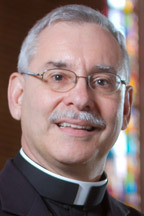
Bishop Anthony B. Taylor delivered this homily Sept. 8.
“In every age, O Lord, you have been our refuge.” Today’s responsorial psalm — literally and figuratively. The entire Bible unfolds as one long story of migration: Abraham migrating from Chaldea to Canaan, Jacob and family migrating from Canaan to Egypt in a time of famine, Moses leading the people out of this land of slavery and Joshua leading them into the Promised Land. Exile in Babylon and return from exile and hence the Bible’s constant injunction not to mistreat the immigrant in their midst, “for you were once strangers in the land of Egypt.”
The same is true in the New Testament: today, Sept. 8, is the feast of the Birth of Mary. Two decades later she will be a refugee in Egypt, fleeing there with Joseph to save the life of their son. Had Egypt put in a militarized border wall like we have on our southern frontier, they might never have made it to safety — and we might never have been saved. “In every age, O Lord, you have been our refuge.”
This month the bishops of the United States are calling on all people of good will to demand from our legislators comprehensive immigration reform that protects the human rights of those who, like our own ancestors, have come to this country in search of a better life. The injustices that our immigrants continue to suffer have gone on far too long and cry out to heaven for redress. “In every age, O Lord, you have been our refuge.”
In today’s Gospel, Jesus says that, “If anyone comes to me without hating his father and mother, wife and children, brothers and sisters, and even his own life, he cannot be my disciple.” This command is a warning that we must commit ourselves completely to God, even if such commitment comes at the expense of our human relationships, our biases and our loyalties to social and political structures with which we identify. For instance an exaggerated, absolutized concept of the rule of law, forgetting that beyond a certain point unjust laws lose their binding force — as in the unjust racial segregation laws of the past and the unjust immigration laws of today.
We are always at risk of putting other things, even good things, ahead of our relationship with God. Therefore it is crucial to constantly reevaluate whether or not we are living out the Gospel commandment that we “love our neighbor as ourselves,” which of necessity requires that we work for the common good of all people. This means being a voice for the voiceless, including the 11 million vulnerable undocumented immigrants in our midst.
Pope Benedict XVI emphasized the following in his address to the bishops of the United States in 2012: “With great generosity, continue to welcome waves of new immigrants, to provide them with pastoral care and charitable assistance and to support ways of regularizing their situation, especially with regard to the unification of families. A particular sign of this is the long-standing commitment of the American bishops to immigration reform.”
In his parable of the Last Judgment in Matthew 25, Jesus insists that in welcoming the stranger we welcome Christ and in rejecting the stranger we reject Christ — and will be punished accordingly. “’When did we see you a stranger and give you no welcome’ ... ’Amen I say to you, what you did not do for one of these least ones, you did not do for me.’ And these will go off to eternal punishment, but the righteous to eternal life.”
So by working to welcome immigrants and protect their rights, we are working to save not only ourselves and them, but also our nation!
This week I sent out a letter to all our parishes addressed to all the Catholics of Arkansas, asking you to contact your representatives in Congress and demand from them comprehensive immigration reform with a path to citizenship now — that letter should be inserted in this week’s bulletin, or you can download it in English by clicking here. A Spanish language version is also available for download, by clicking here.
I also encourage you to read again my pastoral letter on the human rights of immigrants, which will answer many of the questions you may have on this topic. You can download it directly from the website of the Diocese of Little Rock by clicking here.
Please read our Comments Policy before posting.
Article comments powered by Disqus Winning directory photo honors Our Lady of Guadalupe
Winning directory photo honors Our Lady of Guadalupe
 St. Paul says: How does the Bible define love?
St. Paul says: How does the Bible define love?
 6 steps to getting married in Diocese of Little Rock
6 steps to getting married in Diocese of Little Rock
 Most frequently asked questions on Catholic marriage
Most frequently asked questions on Catholic marriage
 St. Joseph a model of solidarity with immigrants
St. Joseph a model of solidarity with immigrants
 Two gifts after Jesus’ death: Virgin Mary and Eucharist
Two gifts after Jesus’ death: Virgin Mary and Eucharist
 Why we have an altar, and not just a communion table
Why we have an altar, and not just a communion table
 Pope: Wars should be resolved through nonviolence
Pope: Wars should be resolved through nonviolence
 Living relationship with Jesus Christ in the Eucharist
Living relationship with Jesus Christ in the Eucharist